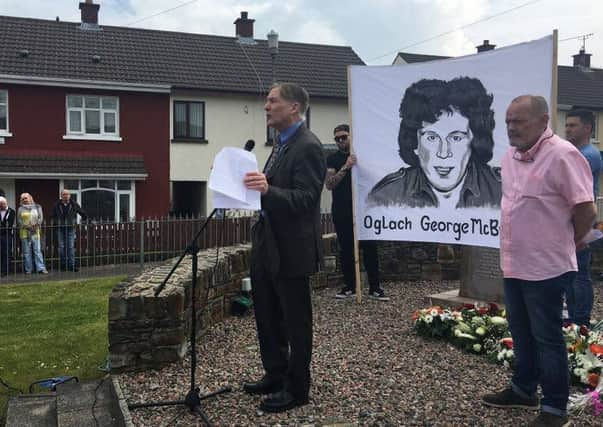SAS killing: Martin Galvin praises '˜true patriot' McBrearty


The main speaker at the event was the former head of NORAID, American Martin Galvin, who in the 1980s defied a British ban on entering Northern Ireland.
Mr Galvin told the crowd: “It is good to be an authentic commemoration, and I use the term authentic deliberately because we have seen too many commemorations lately where people are supposed to be honouring the legacy of patriots. They are supposed to be honouring the ideals for which those patriots stood. We have seen the Irish Government in Dublin where they have used the names of the men and women who in 1916 fought for the freedom of every Irish man and woman according to the Proclamation who were unafraid to take on the British Government to achieve it. But, today the Irish Government does not even mention your freedom in Derry or anywhere else in the Six Counties.”
Advertisement
Hide AdAdvertisement
Hide AdMr Galvin also said that what George McBrearty fought for was no different to the ideals of the men and women of 1916.
He continued: “That’s why I am so proud to be here today at an authentic, a true comemmoration of a true Irish patriot-to stand with the McBrearty family and be unafraid of what he stood for, be unafraid to speak of what he stood for and to demand that what he stood for and fought for will one day be true - your freedom in Derry and for all the North of Ireland.
“All of us are here to honour a patriot with pride. It is important to remember why George McBrearty took the steps that he did. He was born in a city that was three-quarters nationalist but entirely unionist controlled. Because of where his parents sent him to church and to school he would be viewed forever as an enemy of the state, a second class citizen in his own city. If he didn’t get the message that he was unwanted in this state , that he should emigrate or go south, the British Crown Forces were happy to remind him of it anytime they met him on the road.
“When he was 17 he took the fateful decision to join the Derry Brigade and he fought to get the British out of his city, out of the Six Counties and out of everywhere else in Ireland. Over the next seven years George would become the greatest soldier that Derry city ever had, and it would be said that he was to this city what Francis Hughes was to South Derry. I read these words because they are not mine. I didn’t write them for a speech here today. These were the words that IRA leaders at the time had published in An Phoblacht.
Advertisement
Hide AdAdvertisement
Hide Ad“I was sent a copy as editor of the ‘Irish People’ newspaper in New York and asked to cover it after his death in 1981. That was the way that other volunteers felt about him and it was the highest possible praise at that time. He was a true leader. He was somebody that everybody around him would have confidence in. No matter that the British had better equipment and bigger numbers. No matter the advantages they had.
“The people around him felt that they would succeed just because they were standing alongside George.”